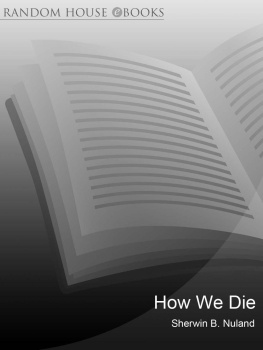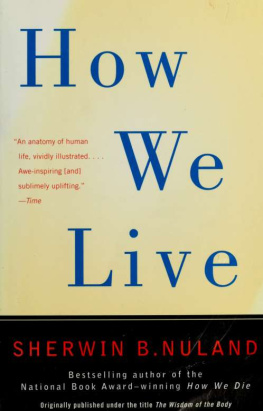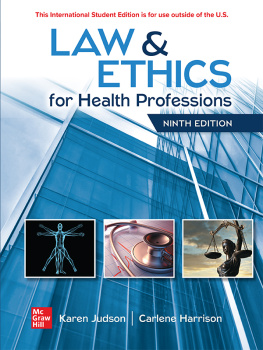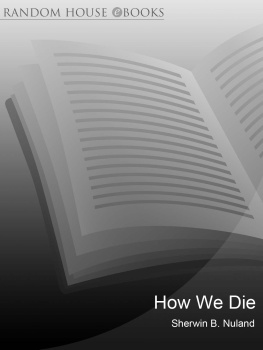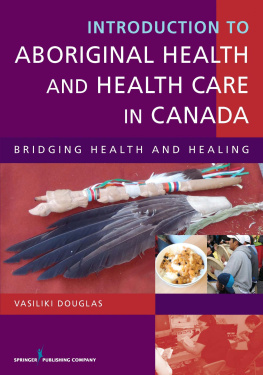Acclaim for Sherwin B. Nuland
The story comes from a sensitive observer... who has seen much, taken much thought, and written it all down with a superior gift for descriptive narrative.... Nulands meditations... reflect a pragmatic, measured skepticism permeated by an intensely human compassion.
Washington Post Book World
Powerfully eloquent... a relentlessly frank and graphic description of the ways human life achieves its terminus.
The New York Times
As powerful and sensitive, and unsparing and unsentimental as anything I have ever read.
Oliver Sacks
Nuland proposes what almost anyone who has been touched by death will recognize as common sense.... [He] never shies away from the cultural implications of his profession.... You cannot read How We Die without becoming aware of your body, if only... to ask it impermissible questions. You put the book down merely to pick it up again.
The New Yorker
Stunningly frank... strips away the fantasy about what happens when the body stops.
Newsweek
Any reader who is not still convinced of his own mortality... is bound to be altered in some profound way by this book.... This is knowledge we all should have.
USA Today
Nuland combines the clinical eye of a trained physician with... emotional and philosophical reflectiveness.
Newsday
About the Author
Sherwin B. Nuland, M.D., is the author of Doctors: The Biography of Medicine . He teaches surgery and the history of medicine at Yale, and is also Literary Editor of Connecticut Medicine and Chairman of the Board of Managers of the Journal of the History of Medicine and Allied Sciences . In addition to his numerous articles for medical publications, he has written for The New Yorker, The New Republic , and Discover magazine. His book The Origins of Anesthesia is a volume in the Classics of Medicine Library. Dr. Nuland and his family live in Hamden, Connecticut.
Also by Sherwin B. Nuland
The Origins of Anesthesia
Doctors: The Biography of Medicine
Medicines: The Art of Healing
The Face of Mercy
This eBook is copyright material and must not be copied, reproduced, transferred, distributed, leased, licensed or publicly performed or used in any way except as specifically permitted in writing by the publishers, as allowed under the terms and conditions under which it was purchased or as strictly permitted by applicable copyright law. Any unauthorised distribution or use of this text may be a direct infringement of the authors and publishers rights and those responsible may be liable in law accordingly.
Epub ISBN: 9781407074689
Version 1.0
www.randomhouse.co.uk
FIRST VINTAGE BOOKS EDITION, JANUARY 1995
Copyright 1993 by Sherwin B. Nuland
All rights reserved under International and Pan-American Copyright Conventions. Published in the United States by Vintage Books, a division of Random House, Inc., New York, and simultaneously in Canada by Random House of Canada Limited, Toronto Originally published in hardcover by Alfred A. Knopf, Inc.,
New York, in 1994.
The Library of Congress has cataloged the Knopf edition as follows:
Nuland, Sherwin B.
How we die / Sherwin B. Nuland.
p. cm.
Includes index.
ISBN: 0-679-41461-4
1. Death. I. Title.
BD444.N85 1994
616.078dc20 93-24590
CIP
Vintage ISBN: 0-679-74244-1
7 9 C 8 6
To my brothers ,
Harvey Nuland and Vittorio Ferrero
... death hath ten thousand several doors
For men to take their exits .
John Webster, The Duchess of Malfi , 1612
Contents
Acknowledgments
The eighteenth-century novelist Laurence Sterne once remarked that writing is but a different name for conversation. The content and tone of a book or essay are determined by the authors perception of the readers anticipated response to each sentence as it is given form on the pagethe reader is always present. The book you are about to read was conceived with no other plan in mind than that of conversing with people who want to know what it is like to die. I have tried to hear how a reader might reply to what is being said. By listening well, I hoped to be able to address every response as immediately and clearly as possible.
The dialogue in these chapters, however, is only the culmination of other conversations I have been having most of my lifewith my family, my friends, my colleagues, and above all my patientswith those who have been closest to me and whose wisdom I have sought in order to come to an understanding of what our lives, and our deaths, are about. To seek wisdom in anothers words is much less difficult than to find it in anothers experience. I have looked for it everywhere I thought it could be discovered. Even when I had no idea I was learning from one or another of the vast number of men and women whose lives have entered mine, they were nevertheless teaching me, usually with equal unawareness of the gift they were bestowing.
Although most learning is thus subtle and unrecognized as such by either its recipients or its providers, a great deal of it does grow out of the more usual kind of conversation: direct verbal interchange between two people. In my own case, the most extensive of those dialogues have gone on intermittently for years or even decades, while a few have taken place only during the writing of the book. If conference [maketh] the ready man as Francis Bacon claimed, then I have been made ready for How We Die by countless hours in the company of extraordinary people.
Several of my fellow members of the Bioethics Committee at the YaleNew Haven Hospital have again and again sharpened my comprehension of critical issues faced not only by patients and health professionals but at one time or another by all of us. I am particularly indebted to Constance Donovan, Thomas Duffy, Margaret Farley, Robert Levine, Virginia Roddy, and Howard Zonanna. Together and individually, they have shown me an image of medical ethics that is as humane (and even spiritual) as it is intellectually disciplined.
Thanks go also to another member of the committee, Alan Mermann, a pediatrician who found renewed vigor as a Congregationalist minister and the chaplain of our medical school. He has been generous in helping me understand what it is like for medical students and dying patients to befriend each other and share one anothers fears and hopes.
Ferenc Gyorgyey has made available the vast resources of the historical collections at Yales Cushing/Whitney Library, but his even greater gift during these many years has been the equally vast resources of his friendship and his wide-ranging intellect. Jay Katz, both in our conversations and in his writings, has taught me a sensitivity to medical decision-making that transcends the mere clinical facts of a patients illness and even the conscious motivations that would seem to determine choice of treatment options. My wife, Sarah Peterson, teaches me yet another kind of sensitivity, which is sometimes called charity and sometimes called love. In charity or love there is an understanding of anothers perceptions and there is also unquenchable faith. In Sarahs tradition: Though I speak with the tongues of men and of angels and have not love, I become as a sounding brass or a tinkling cymbal. Therein lies a great lesson not only for individuals but for nations and professionsespecially my own profession of medicine.
For the past decade, I have benefited from the friendship of Robert Massey. As a practicing internist, a medical school dean, and a historian of medicine as well as a commentator on its present and future, Bob Massey has transmitted to several generations of his physician colleagues a dimension of understanding and a sense of medical obligation that surpass the ephemeral concerns of the moment and the parochial concerns of the guild. I have taken advantage of his friendship by making him my sounding board, my oracle, and even my authority for classical allusions, not to mention Latin grammar. There is almost nothing in this book that he and I have not discussed. His confidence in the value of this undertaking has been a source of quiet energy for me over these many months of work.

